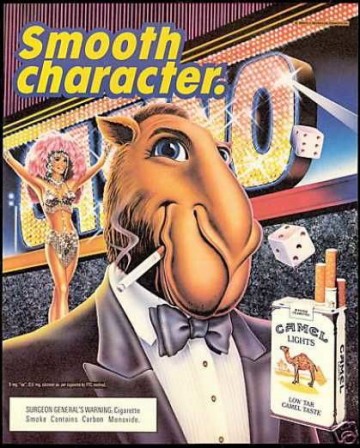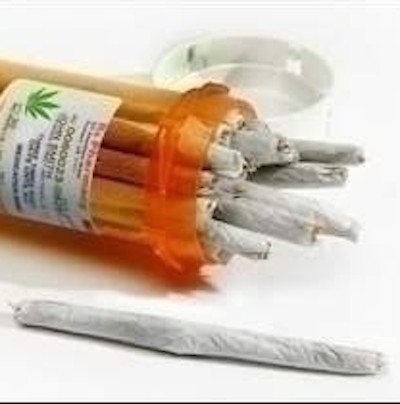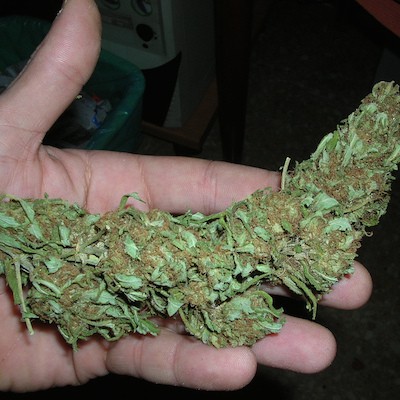How Will Pot Advertising in Oregon Differ from Tobacco?
Tuesday, June 23, 2015

OLCC spokesperson Tom Towslee roughly explained what advertising is likely to be permitted. “There will probably be some kind of where and when advertising will be available,” he said.
Echoing cigarette regulations, there probably won’t be a Joe Camel of marijuana advertising. Regulators will make sure advertising doesn’t appeal to children, said Towslee. “But Oregon has pretty broad free speech (rights) in its constitution so we’ll need to see exactly what we can do in order to meet the need to protect children and still not infringe on people’s free speech rights.”
At one time, cigarette ads said pretty much whatever manufacturers wanted.
It wasn’t until 1965 that cigarette ads required a health warning by federal law, let alone targeted children as potential buyers of cigarettes. One Chesterfield ad suggests a boy should buy his parents cigarettes for Mother’s Day or Father’s Day. “I remember, Momma and Poppa!” the print ad reads.
Until 1970, cigarette ads were allowed on TV and radio, and it wasn’t until 1998, that advertising aimed at children was prohibited.
This kind of leeway is illegal in the U.S. today. Laws after 1965 progressively restricted the tobacco industry’s advertising abilities and replaced that freedom with stringent rules requiring reporting of all additives to tobacco products and prominent posting of health warnings on all packaging.

Joe Camel ad via Wikimedia Commons.
While tobacco advertising regulations set some precedence, the differences between the two substances means a comparison isn’t perfect.
For starters, medical consensus on cannabis is much less settled than it is on tobacco. The World Health Organization considers tobacco one of the “biggest public health threats” in the world, saying it causes cancer, lung diseases and cardiovascular diseases. WHO held a Convention on Tobacco Control in 2005 signed by 180 countries (covering around 90 percent of the world’s population). The agreement means all countries must take steps to ban tobacco advertising unless their constitution forbids it.
In contrast, while the WHO warns of health effects of cannabis, such as impairment of cognitive development and psychomotor performance, it also notes the therapeutic effects of cannabis and calls for more research.
The U.S. surgeon general’s warning highlights the chronic health problems that could occur from marijuana use, but since marijuana sales are not legal, there are no federal guidelines on advertising.
While it will be legal to possess marijuana on July 1, retail sales of marijuana will not begin until 2016. The OLCC begins accepting license applications from interested retailers on Jan. 4.
To prepare for the official sale of recreational marijuana, this summer, the OLCC is planning a series of regulations on everything from advertising to growing, processing and selling marijuana. A handful of subcommittees are discussing each specialty area and providing recommendations to a general advisory committee, which will then pass on a final recommendation to the OLCC for an approval likely in October or November, Towslee explained.
Towslee said advertising isn’t really a “huge issue” for the OLCC, but it is something that needs to be addressed: “It’s just one of those issues we’ve got to work through, so when the time comes, people who want to advertise know what the rules are.”
Currently, the OLCC regulates some advertising of alcohol within the premises of an alcohol retailer, including providing customers with information about discounts or sales. However, signs cannot be viewable from outside of the store.
Beyond the store, the Federal Alcohol Administration Act governs advertising content in print, radio, television or on the Internet. The regulations prohibit false or misleading statements that disparage a competitor, are money-back guarantees, are regarding health-related information, or are not in line with the approved label.
Related Slideshow: 7 Things Oregon Can Learn from Legal Marijuana in Washington
In the wake of what many business owners, lobbyists and advocates call a rocky implementation of recreational marijuana in Washington, Oregon regulators have the opportunity to learn from their neighbor to the north.


















Follow us on Pinterest Google + Facebook Twitter See It Read It